











Would you like

• More money
• More time
• More peace
• More health
…without putting much effort into it?


Who wouldn’t?! And the amazing thing is that you can get all of this simply by clearing your clutter!
This is why we have set up a whole campaign to get everyone in the UK to get rid of the junk in their life – physical, mental, digital –so that they can have a better time all round.
The professional organisers at APDO (the Association of Professional De-clutterers and Organisers) “Simplify and organise your space and you’ll feel happier, because it’s people and experiences that enrich our lives, not accumulating more things. You will get more done too, because clutter is a visual distraction – remove it and you’ll find you are able to think much more clearly and focus on what you need to achieve.”
So follow the ten-step plan in this eBook and you will be wealthier, healthier and a lot more organised day-to-day!
Share your decluttering dilemmas and successes on Twitter using the hashtag #ClearYourClutter and follow @ClearClutterDay



Clutter can creep up on the best of us, and irrespective of your organisational personality and style, a bit of spring cleaning and organisation never goes amiss. Why is it important? Because life is easier, less stressful and actually cheaper (!) if you’re not having to constantly navigate clutter.


• You’ll save time because you won’t be endlessly looking for lost items
• And this will give you more time for the things you want to do
• You will also save money by knowing what you need and only buying those items instead of buying several versions of something you already have
• You will feel less stressed by living in a clutter-free environment
• You can make money by selling things you no longer want or need

• You can help the world (seriously) by giving the junk you don’t sell to charity shops and free sites.
We are big fans of the Four Box Method.
Remarkably, this involves FOUR BOXES. Yes! Amazing huh?
In fact, you can watch Jasmine’s handy video from 2016 of how to do it here:
Just pick a room – maybe the one with the most junk – and grab some bags, boxes or anything else you have to hand.
So, as you clear your clutter, just put things you don’t want to keep into one of the four boxes (or bags) that you have designated as above: Throw, Sell, Charity and Mend.
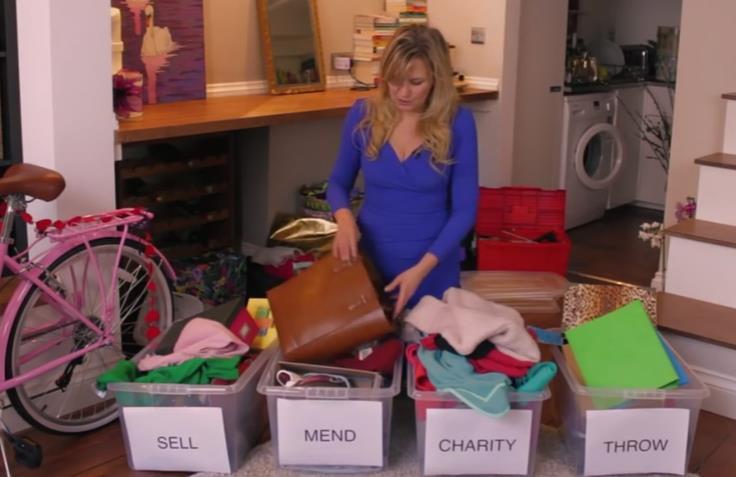

Nice easy one this. If something is beyond repair, broken, mouldy or so full of holes there’s no point, throw it away. You could, of course, have a double box/bag here with one for stuff that could be recycled (paper-based, metal, glass or fabric items) and the other one for the bin proper.
This box will need to be divided later into ‘Things to sell at auction’, ‘Things to sell online’, ‘Things to sell at a car boot sale’ and more. In fact, you might end up with so many things to sell that you could have a garage sale and get rid of a load in one go. See page 8 for more info on how to do all of these.
You could also put here things to swap with friends. Cosmetics, clothes, bags etc could be added to this list.
This is another nice easy one. The lovely thing about giving items to charity is that, like throwing things away, it’s quick and can be done now, giving you free space immediately. It also gives you the feel good
factor of knowing that you have effectively given to charity and done some good to society without spending any money. Of course, you can’t give everything to charity. On the whole they won’t take certain items such as furs, electrical goods or cosmetics (see more on page 28) but those can either be offered for free on Freecycle.org or put aside to swap with friends.
So next time you’re watching TV, take one of these items out (electronics that need tweaking, jeans that need mending) and gradually give them new life. Also, though, in this box you could have items that could be recycled and made into something more exciting. They could be recycled into presents for friends and family. See page 13 for more ideas on how to recycle and upcycle things for profit.
Watch Jasmine’s Helpful Video (Click the image)


Our friends at Fellowes® – experts in all things organisation – give these expert tips on making inroads in your cluttered rooms:

• There’s no ‘one fits all’ method to tackling a clutter catastrophe – order the things that you need the most in convenient and accessible places and be sure to keep essentials close by!

• You can still make a difference by tidying in small bursts. Having suitable storage solutions will present a sense of order and facilitate an efficient and organised home.
• It’s important to create good habits in the home, in particular the places that can become magnets for clutter. Each room will have its own storage needs for items that need to be kept out of sight, creating more space to display the items that mean the most.
• Always consider the most lived in spaces within your home – whether that’s the office or the kitchen, these rooms often hoard the most clutter.
• It’s important to prioritise what goes where. Be sure that your de-cluttering regime suits you, your home, family and lifestyle.
• If you’re overcome by mail, catalogues and general home admin, investing in a sleek deskside shredder for the home will keep the paper clutter at bay whilst reassuring you that anything confidential is fully disposed of.



The professional de-clutterers and organisers at APDO offer these great tips:

• Don’t delay decisions - Avoid the temptation to put unwanted possessions ‘out of sight and out of mind’, whether that’s in a cupboard, attic, shed or in selfstorage outside the home. You’re essentially just postponing dealing with the clutter – just because it’s out of sight, it doesn’t mean it can’t weigh on your mind.
• Don’t give up - When you start decluttering and organising, things can (and probably will) look worse before they get better. The key is to commit some time to the process, not become distracted by other tasks and to push through feelings of being overwhelmed.
• Break it down - Rome wasn’t built in a day. It took longer than one weekend for things to become disordered so it will take time to solve the problem. Don’t be discouraged if it seems like you have a mountain to climb. Break down the task into bite sized chunks and it will be far more manageable.
• Be realistic – get sensible idea of what your stuff is really worth to the outside world. Find avenues that you can sell or donate your stuff quickly and easily. Avoid creating a mountain in the corner of items you plan to sell ‘one day’. Remember ‘Oneday’ and ‘Someday’ are not real days of the week so you’ll never get around to them!
• Ask for help - A professional organiser can help you clear a path through the mess and stress in order to achieve a calmer home and life. They have the experience and ideas to help you make the most out of the space you have, as well as guide you on what to do with unwanted possessions and teach you how to maintain the changes for good.

Why not follow APDO on Twitter and join their Facebook page for bucket loads of useful tips throughout the year.
Share your decluttering dilemmas and successes on Twitter using the hashtag #ClearYourClutter and follow @ClearClutterDay

There are two main ways you can make money from de-cluttering:
• Upcycle it into something even better and sell it, use it yourself (thus saving money) or give it away as a gift
But there’s an added ‘cash bonus’ with decluttering too. You can rent out your newly free space and add that money to your pot. We’ll show you how to do that here too.

It’s likely that, right now, you are sitting on thousands of pounds-worth of junk in your home. A good clear-out, involving sorting the things around you into stuff to give away, stuff to throw out and stuff to sell, will show you pretty quickly just how much treasure you actually have in your home.
Thanks to the internet, there are now lots of places you can sell your things, it doesn’t just have to be a car boot sale (although those can be a really good way of making some quick cash).
Here’s how you can make maximum profit from the things you no longer need:
Rummage in your messy drawer (we all have at least one!) and you will probably find an ancient old phone.
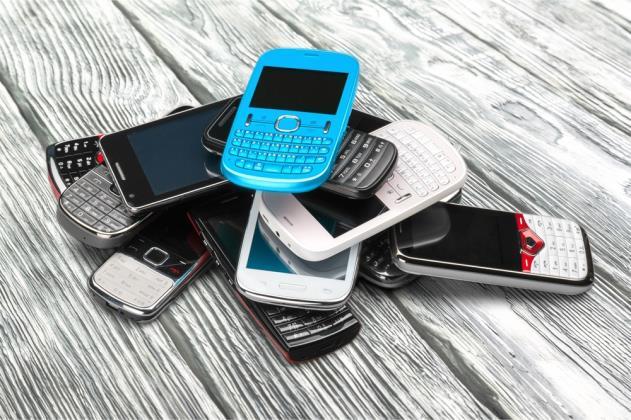
Even if it is really old and broken you can make money from it – at least a fiver. Use the MoneyMagpie mobile recycling tool, you could make up to £450 if you have a recent smartphone to sell!
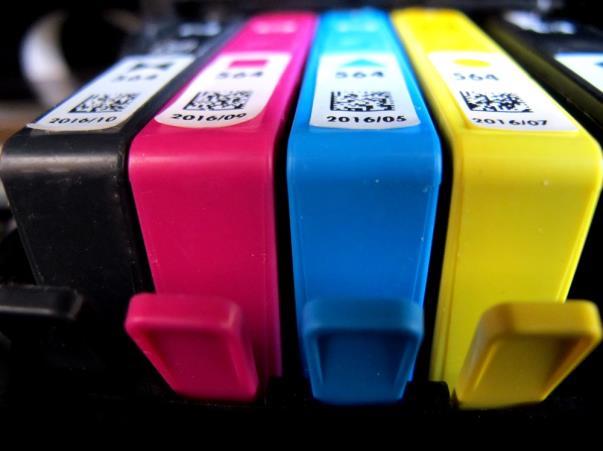

Share your decluttering dilemmas and successes on Twitter using the hashtag #ClearYourClutter and follow @ClearClutterDay
An estimated 57 million printer cartridges end up in landfill every year. Do your bit by recycling and make quick cash while you’re at it!
Cash for Cartridges will pay up to £4.50 for your old ink cartridges. Once you’ve set up a free account on their website you can post old cartridges to them for free. The drawback here is that they only pay out when your account reaches £25, so if you don’t use loads of ink it may take you a little while to see your money.
Recycle Ink Cartridges will collect for free and offer to make a donation to charity on your behalf. Alternatively you can opt to receive high street vouchers instead.
GreenTech offer up to £12 for each used ink cartridge and also collect from you free of charge. They promise to pay you within 14 days of receiving your old cartridges.

For laptops, ipads, digital cameras, desktop PCs and more, try Cashinyourgadgets.co.uk.

Admittedly you could get more money by selling them on eBay but if you need the money now, this site is easy to use and will give you money quickly.
A nice, easy way to get pretty much instant cash for these is to download the Ziffit app which enables you to scan the barcodes of your items to see how much you could get. If you’re happy with the price offered then you just need to pack your items (they can all go in the same box) and you can then either drop it off at one of their Collect+Stores or use their free courier service.
Amazon can be a good place to sell books, particularly if they’re quite specialist. You can advertise for free, and you don’t have to pay delivery charges. However, they do take 17.25% of the sale price as commission (they call it a ‘closing fee’).
A lot of furniture doesn’t hold its value so
even if your sofa is just a year old, you may not get more than half its value when you sell it.
However, using local sources like Gumtree, Facebook groups and local auction houses (if your item is good) you can often get a better price than eBay because there isn’t so much of an issue with transporting it.
If you have a good, vintage piece you could try Layer, which sells vintage furniture, lamps, mirrors, vases and more. They provide a free listing and a bespoke service and only charge fee once the item has sold.

Car boot sales are quick cash but they’re not necessarily the best place to get top prices for things so don’t take valuable items that you could sell well online.
Perfumes (even half used), furniture, plants, toys and children’s clothes always do well, as do books, vinyl, CDs and the like.
Also remember to keep the pricing simple, people love haggling and they love a bargain. It might be worthwhile marking items up slightly so that if people want to haggle you’ll feel more inclined to lower the price.
For an in depth guide check this seven step guide on how to make the most of car boot sales
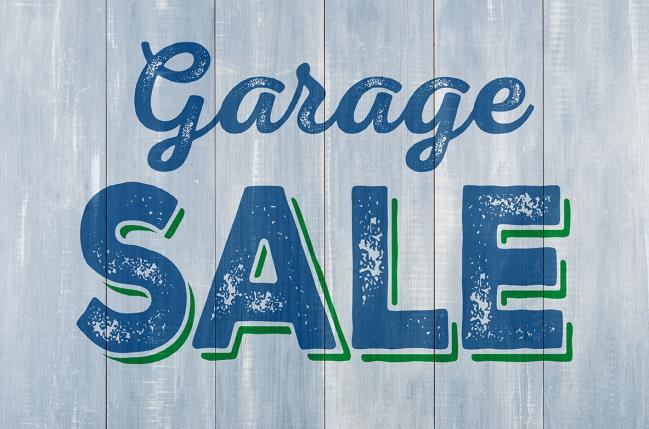
It’s an American concept but it’s pretty popular here, particularly if you can’t be bothered going all the way to the car boot sale. Get all your junk together from the whole house (and whatever is lurking in the garage already) and have a sale.
Some things you could even rent now. As we show in our article called make and save money from renting, there are websites where you can rent anything from a ballgown to a baby bath. If you’ve got old equipment, baby things or tools in your attic, dust them off and rent them out.
So this isn’t quite clearing clutter, but it is potentially making money from it. Rent your gadgets, clothes, accessories and tools through Zilok to get some cash in.
Whether you get customers will depend on what you are renting and where you are in the country, but it’s worth a look, particularly if you have tools that you only use a couple of times a year.
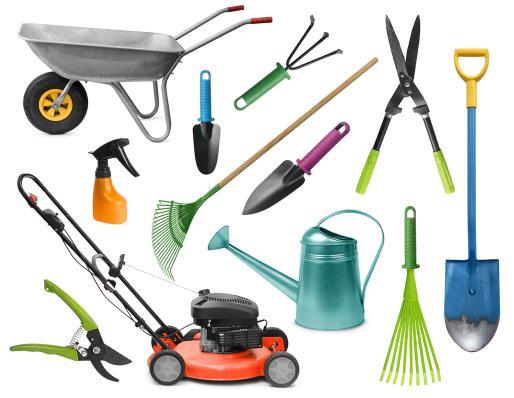


If you’re more of an indoors bod then perhaps fairs and car boots aren’t for you (especially if it’s raining!).
Fear not! Vintage shops will be more up your street. Google local vintage and antique shops in your area, and we can almost guarantee they’ll be able to help. Find out more about how to make money from vintage clothes here.

It used to be that we only used eBay to sell our junk but, as you can see above, the internet has brought a host of specialist sites that help sell all kinds of things.
There are also other ways to sell a host of unwanted items that can be cheaper and quicker than eBay.


Local community Facebook groups for selling or swapping your belongings are becoming a very popular choice to sell or simply giveaway unwanted clutter.
The best bit is there are no fees, so you get to keep the profit. There are hundreds of Facebook buying and selling groups in the UK and all over the world.
To get started, search for your area or postcode in the main search box, alongside words such as 'selling', 'sale' or 'buy'. It’s also considered a safe and trustworthy selling option as most people only have friends and family on Facebook.
Don’t forget to come and say hi on our National Clear Your Clutter Day Facebook
page.
From now until the end of March 2017 we have lots of Clear Your Clutter Day competition prizes to win! Don’t miss out.

This site lets you auction off your goods a bit like you do on eBay and eBid, with one main difference – you don’t get any money for them. Instead, you receive Swapit points which you can then use to buy more desirable items. This site is particularly handy for children’s toys, and it’s easy for children to use since there are no credit cards involved. You can buy Swapit points, but this is done through PayPal, your mobile phone, cash, cheque or postal order – so your money should always be safe. Earn extra points by referring friends and completing offers on the website.

Share your decluttering dilemmas and successes on Twitter using the hashtag #ClearYourClutter and follow @ClearClutterDay

Then, once you have a super-tidy, decluttered house…make money out of that!
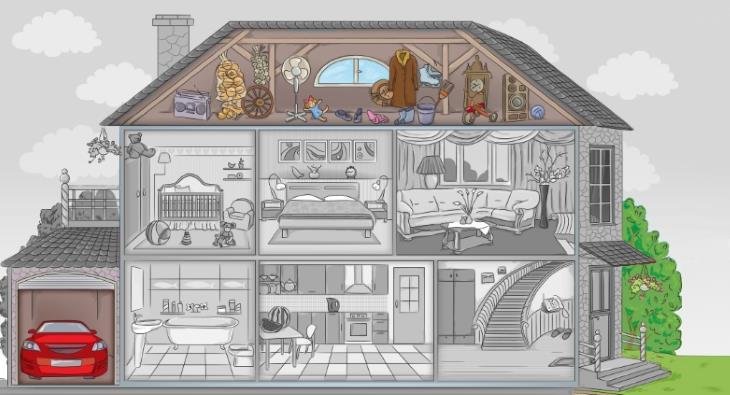
If your garage is full of bits and bobs that you neither need nor want, it’s time to clear it all out and start making money by renting it to others for parking on sites like Park Let and JustPark

The money you make will vary depending on your location – if you live somewhere popular, near a city centre, stations or sports ground, you could make some serious money.
Even if you need your garage space for your car you can always just rent out your driveway on the same sites.
Once you’ve made some room in your garage you can rent out the space for storage on a site like Spareground
This is such a simple way to make extra money and involves almost no effort on your part. People may want somewhere to store sports equipment, furniture or machinery and will be willing to pay you to use your free space.
Listing your space on Spareground won’t cost you a penny – all you have to do is register your name and address. People needing storage space can then get in touch with you through Spareground.

There’s no obligation on your part to pick any particular person to rent your space to – the owner is always in complete control and decides how much to charge. Find out more in our full article on renting out your driveway or garage.
Get a lodger for an extra income - Have a look at EasyRoommate – it’s free to post an ad. Or check out Airbnb
How much you make will obviously depend on where you live and the size of the room but the good news is that you can earn up to £7,500 a year from renting a room without having to pay a penny in tax! Take a look at our article on renting a room to foreign students.
As with your garage, you could also rent our your attic simply as storage space by advertising that space (for free) on Spareground or Gumtree. Simply register your details then wait for someone to get in touch with you – you decide who to rent to and how much to charge.

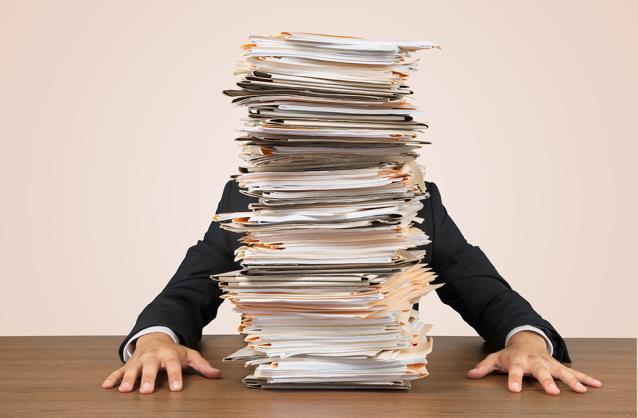
We all have it and it’s making us poorer: financial clutter has to go if we’re going to keep more of the money we make each month.
So while you’re de-cluttering your things, spend an hour or two tidying up your financial areas to maximise profit.
The first thing you need to do in your walk to financial freedom is to ‘Face the tiger’. You need to know exactly what you’re up against, and the way to do that is…wait for it…to open your statements and bills and actually see what the damage is.
Maybe get a friend or family member to sit with you as you open them, or just put a film on the TV that you like and sort them as you watch it. It doesn’t matter how you do it…just do it!
Once you have opened up all the statements and bills you can find (and maybe have printed some off the internet if that’s how you get them), put them in date order and place them in piles on the floor or the table, wherever you’re doing it, one pile per bank/utility or whatever it is.
Now you can put them in a lever arch file, or a filing cabinet or, if you’re doing things digitally, scan them and file them online together with pdfs of your online statements.
Because doing a budget is a whole lot more glamorous than it sounds. It’s your first step to really getting on top of your money and becoming rich.
Download our free eBook “I’m not made of money! Budgeting tips stressed parents”.
You might not have done this for quite a while. In fact, they might still be in their envelopes, stuffed in a drawer by the front door because you can’t bear to look at them.
That’s perfectly understandable and loads of people do that.
But it’s not going to help.
So, do whatever it takes to get them out into the open and into some sort of order.
Get your free debt support here

They’re easy to do, particularly as there are online tools to help now. Here’s a step-bystep guide to doing a budget – either online or on the back of an envelope!
So follow those steps, find out what money is coming in and going out each month, and take back control!

Get your last gas and electricity bill(s) if you can, or just arm yourself with your postcode and go onto this energy comparison site.

After answering a few questions you should be able to save at least £200 for the year by switching to a better deal and it only takes 15 minutes! Easy money.


When your current deal is coming to an end, go onto this comparison sit and find a better offer. You should be able to save £100s in half an hour. Even if your deal hasn’t finished yet, you might still be able to save by switching now and getting a rebate from your current provider.
They’re old, tired and costing you money: it’s time to cleanse your bills and make sure they’re as lean and keen as possible.
Now is a good time to sit in front of the computer and switch your utility provider, your insurance companies, your mobile and broadband providers, bank and more.
Make them work for you,

Changing could save you hundreds of pounds, with tariffs changing so often it’s hard to keep up with it, and companies both trying to get customers from their rivals or persuade them to stay loyal to them.
In some cases your current provider will want to keep you as a customer and may be persuaded to match or better deals you find elsewhere.
With bank accounts, many people think it’s more trouble than it’s worth to ensure all their payments and debits are changed.
But there’s a chance you don’t have the best account for your needs, such as overdraft provision, or benefits like car breakdown cover.
So…

Same deal. Again, you should be able to save a decent amount over the year by spending just half an hour on this comparison site - particularly if you switch both building and contents insurance together.
Like travel insurance and pet insurance.
Get a much better deal on your broadband or your whole TV, phone and broadband package here.



In fact, consider giving up the TV package as these can be stupidly expensive. Try cheaper alternatives such a Netflix or Now TV.
You can also get a cheaper landline (if you’re still using yours – cancel it if not).
Did you know?
• A third of Brits use their home phone once a month or less. Get rid of line rental from your broadband package with Relish and save money
• Switching broadband providers could help declutter your outgoings and streamline your bills, saving you money in the process
• Do you watch Netflix more than TV? Cutting out a television package from your broadband contract may be a great way to save money
• Own a business in London and looking to streamline your outgoings? @Relish business broadband offers short term contracts and unlimited data
• Want to switch broadband providers this March but worried about ‘internet blackout’? Relish offers free next day delivery to get you online quickly
These are pretty easy to do but it’s a good idea to stagger them, particularly with the bank account and credit cards as every time you apply for any sort of credit it’s logged on your credit report.
Applying for more than two lines of credit per month will bring your score down. However, if you’re currently wasting money paying loads of interest on an overdraft or credit card, it’s worth moving at least one of them now.
Compare credit card rates and bank accounts here. Then compare your various Savings accounts options.
You should be able to free up a few hundred pounds over the year just by doing these few switches. If you have a mortgage, you could potentially save well over a thousand a year by switching that, if you’re out of your fixed rate term.
Speak to our award-winning mortgage brokers to see how much you could save.
While you’re switching, make sure your Experian Credit Report is accurate and up-to-date. Your credit report can show you if you’ve missed some payments on cards or loans you have.

Doing this could help you be better off in the long term, as when you make an application for a loan, credit card, mortgage or other type of credit – like a new utility contract or a mobile-phone account – lenders look at your credit report to work out a credit score for you.
Lenders like to see evidence that you might be a responsible borrower, and given that late or missed repayments stay on your credit report for at least six years, it’s a good idea to make your repayments on time if you can.
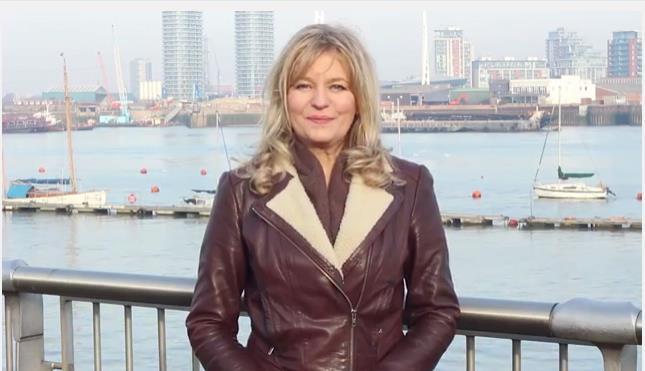
Checking your Experian Credit Score before you apply for new credit can give you a good indication of how lenders see you.

Check out our video we made about how to de-clutter your finances (click image below to watch)

Check out these Simple savings to clear your clutter
Share your decluttering dilemmas and successes on Twitter using the hashtag #ClearYourClutter and follow @ClearClutterDay

How stress-free would you be if you could easily find all your files, get some practical use from your social media accounts and actually liked how your computer desktop looked?
Let’s get you there with these 7 steps to clearing your digital clutter
There’s nothing worse than saving a file and then spending twenty minutes of clicking to locate it.
Avoid this by creating a naming convention for folders that contain your most important and most used files.
In Macs, you can use symbols at the start of folder names (_, -, <, (, [, and) to control the order in which the folders are displayed. And in PCs you can use numbers.
Once you’ve created the folders, move all the relevant files into each folder. This is also a great opportunity to delete files and folders you don’t use anymore.
This should be done on an ongoing basis, so if you don’t, start today!
You can either back up your files using an external hard drive like this one, or use an online version like Dropbox
This essentially ensures you have a copy of all your files in case your computer crashes and all hell breaks loose in life.
The final thing is to create a reminder in your calendar to back-up your files continually. I recommend doing this at least monthly, if not weekly.

Bookmarks: How many websites or articles have you bookmarked to come back to and then … haven’t?

Clear this up by: Going to your bookmarks list (by selecting Ctrl + Shift + O in Chrome or the bookmarks/favourites manager in your browser)
Look at the list and delete the pages you’ll never read or use.
Create folders for pages that can be grouped together (for example, I use free photo websites a lot, so have five saved in a folder called Photos)
Go through the same process of file organisation in cloud storage (like Dropbox or Google Drive).


What files are copied multiple times needlessly? What haven’t you opened or used in the last 12 months? Delete them. Be brave!
To remove the need for bookmarks in your browser altogether, Pocket helps you store them all in one app or taskbar. Handy!

Some say that the state of your desktop accurately describes the state of your mind. What does your computer desktop say about you?
We often create shortcuts, use them once or twice, and then leave them hanging on the desktop for nothing.
What shortcuts can you add to the task bar at the bottom of your computer screen? Move the shortcuts there and delete them from your desktop.
Which shortcuts do you simply never use? To figure this out, delete all the shortcuts and then watch which ones you search for. Do this for a week and then add the ones you use daily as shortcuts on your desktop.

On your phone: Look at all the apps on your phone and write down the ones you simply don’t use. Be honest! Then delete them from the apps manager tool.

Bonus tip – Is your smartphone running out of space? Then simply move photos and videos off your phone (and onto the folder on your computer or cloud backup device) and delete them from your phone.
On your desktop: Do the same with apps on your desktop plus apps not added as shortcuts.
For those apps that you’d like to keep, check their settings and see if they’re set to start automatically when your computer starts. Apps like Skype and Spotify do this.
Go to the settings in each app, disable the auto-start function and allow your computer to start faster. It also stops them running in the background. Smart.
Share your decluttering dilemmas and successes on Twitter using the hashtag #ClearYourClutter and follow

Facebook: What Facebook groups are you part of that you simply don’t use?

Just leave them! Or at the very least, turn off notifications so you’re not bombarded with updates all day. Do this by going into Groups, and hovering the mouse over the wheel icon on the far right. Here you can either change notification settings or leave the group altogether.
Do the same with LinkedIn groups.

If you head to Facebook to check messages but get sucked into scrolling through your newsfeed and aimlessly watching videos then do yourself a favour and add the Facebook Newsfeed Eradicator for Chrome.
Twitter: Take a look through your newsfeed for the last 48 hours. How much of that was actually useful to you? For those things that weren’t, unfollow the accounts. Or if you’re not ready to let go just yet, add the accounts to lists. This article from Twitter explains how (and gives you back control).
Good luck!
We have a fun video here that shows you in cartoon form, how to declutter your digital life. Take a look!
Share your decluttering dilemmas and successes on Twitter using the hashtag #ClearYourClutter and follow @ClearClutterDay
7. Simplify your home broadband package
One way of de-cluttering your monthly outgoing – and your digital life - is to switch internet providers. Many people sign up to ‘broadband bundles’ and end up paying for a landline and television package that goes unused.
If you don’t use your home-phone to make calls and watch most of your favourite shows on Netflix, doing away with ‘bundles’ and opting for a broadband-only package can help de-clutter your bills and save you money.
Instagram: Instagram doesn’t have the list
Remember that what you see on social media feeds your mind.
Control what that is (and give your mind something positive) by following those accounts that add value to your daily life.
Feeling overwhelmed with what’s involved in a digital declutter? Make it easy on yourself by picking one thing from the list above to do each week.
That’s 8 weeks to a 100% digital declutter.
Also, many consumers are put off switching internet providers by the thought of being without internet for weeks on end so they miss out on real savings. Relish offers same day delivery (for a one-off £20 delivery fee) or free next day delivery, getting you online quickly and hassle free.



It’s one thing to clear your physical clutter but clearing your mental clutter is probably even more important.
Do you find yourself regularly bothering about small, unimportant things?

Do you check your Facebook and Twitter statuses constantly?

Are you concerned with what’s happening to celebs, people in soaps, and your neighbours?
If lots of little, annoying, upsetting and largely trivial things are cluttering up your thoughts and emotions through the day, you’re going to be held back in life and the physical clutter will manifest itself around you again, as our surroundings tend to mirror our thoughts.
So, what can you do about mental clutter?
Here are a few habits to cultivate:
American professional de-clutterer Peggy Caruso says “recognising and being thankful for the good things in your life can keep you from adding new clutter”.
She recommends that people take a moment each day to acknowledge and appreciate what they have. She says it will also help you forgive grievances - another thing that can clutter up our thinking!
It’s an idea that has been around from ancient times. In the book of Isaiah in the Bible we are told “Be still, and know that I am God.” We can do that at any time of the day or night.
In fact, if you can do it, don’t just cut down...give up on social media completely. If that’s a bit hard core, just look at it once a day.
This is something I’m hopeless at, but all the time management people say it’s the best way to keep emails under control. If you can do it then do. It is a good way to keep it in its place. Also don’t read emails or social media at the weekend. It will suck you in!
Go without a mobile phone for a day every now and then. In fact, when you go on holiday try to switch your phone off for the whole time…or at least most of it.
Put your phone on ‘mute’ for a few hours in the day
That way you will get messages and texts and you can see who has called you but you won’t hear the rings or dings.

Oh, and that includes YouTube…so don’t cheat! This isn’t just good for your mental health, it’s good for your wealth too.
According to Thomas Corley, author of ‘Rich Habits: The Daily Success Habits of Wealthy Individuals’, 67% of rich people only watch TV for one hour or less per day. Also, just 6% of the wealthy watch reality shows, while 78% of the poor do.

Talk about clutter! Magazines, newspapers, catalogues and all those free publications that get pushed through the door can pile up
and make a room look messy in minutes. Live…really live
Once you’ve got rid of some of the time and mental energy wasters above, use the extra freedom to spend more quality time with friends and family, to spend more time outside. Maybe get that pet that you’ve been thinking about for ages.
Some of the things you could do with your extra freedom are to:
• Take advantage of the many free events and venues in your area. Check your local council website to see what events they might be holding for free for the community and do those.
• Go to your local library for talks and events, go to free museums and galleries.
• Check out free events in your area on the free events websites such as Freeevents.co.uk or Freelondonevents.co.uk and Daysoutguide.co.uk.

• Have people round, make them food and play board games in your newly-decluttered home.
Share your decluttering dilemmas and successes on Twitter using the hashtag #ClearYourClutter and follow @ClearClutterDay

home. The clutter is literally stopping them thinking straight. His book gives people a system to follow in order to de-clutter their homes and lose the extra pounds (or stone in many cases).
In an interview with USA today, Walsh said: “I ran a test panel of 25 people through the six-week program and found great results. The average weight loss was 10 pounds, and the amount of stuff that left their homes was close to 40%. And, every single person in the program lost weight. What we found is that for these people getting on top of the clutter in their homes helped them get on top of other issues going on in their lives as well.”

So, would you like to lose weight while you de-clutter? Here are the steps to take:

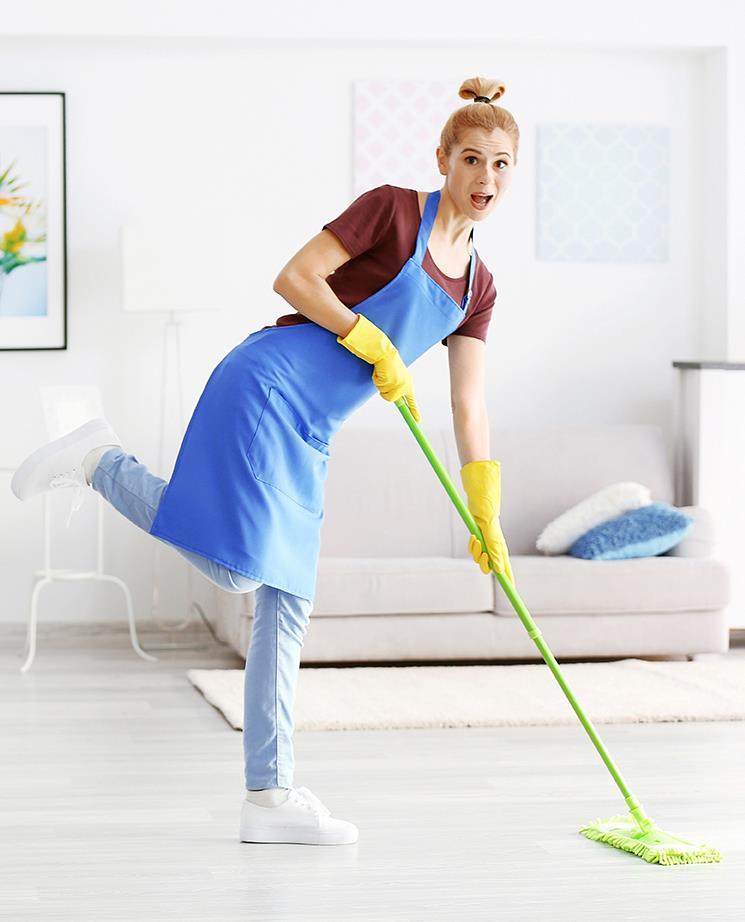
De-clutter and lose weight. Sounds weird?
Well, read on because there is a connection between extra stuff around your home and extra stuff around your waistline!
Clutter is a state of mind and it can pervade all areas of your life, including your body and the weight you attach to it.
Research in recent years (particularly in America where they have the most ‘stuff’ and the highest obesity levels) shows again and again that people who lead cluttered lives in cluttered homes are more likely to be overweight than those who don’t.
American professional organiser, Peter Walsh, author of ‘Lose the Clutter, Lose the Weight’, says that people with cluttered homes are 77% more likely to be overweight or obese.
He says people can’t make their best and healthiest choices in a messy and cluttered
Lynne Johnson, another professional organiser, says she often sees a link between her clients’ efforts to get organised and their weight loss. She says “I think someone decides, ‘I’m not going to live like this anymore. I’m not going to hold onto my stuff, I’m not going to hold onto my weight.”
Dr. Pamela Peeke, assistant clinical professor of medicine at the University of Maryland is the author of ‘Fit to Live’, in which she also has a section about the link between health and being organised. She says she often instructs patients trying to lose weight to at least create one clean and uncluttered place in their home.
She also suggests keeping a gym bag with workout clothes and trainers in a part of the house that is uncluttered to make it easier for them to exercise. Sometimes the problem is that basic.

Dr Peeke also says that she had one patient whose garage was “a solid cube of clutter.” But the woman cleaned up her home and, in the process, lost nearly four stone. “It wasn’t, at the end of the day, about her weight,” Dr. Peeke says, “it was about uncluttering at multiple levels of her life.”
the less a man needs, the nearer does he approach to divinity.”
If you find yourself buying, hoarding and binge-eating, it’s time to acquaint yourself with the Divine which is the only thing that really fills anyone up.


If we feel the need to accumulate to make us feel whole and happy, it’s likely that that will spill over into the way we approach food. We are constantly trying to fill a void that is really a spiritual and emotional one. As Socrates said: “To need nothing is divine and
A new study by the Food and Brand Lab at Cornell University in the States has found that dirty, cluttered and chaotic kitchens can make us eat more unhealthy snacks.
Putting fattening foods out of sight, in cupboards, and fruit easily-accessible, tends to help people eat healthily and lose weight.
Share your decluttering dilemmas and successes on Twitter using the hashtag #ClearYourClutter and follow @ClearClutterDay


Don’t worry, you don’t need your gym kit for these!
Once you have decided to de-clutter you are already on your way to losing weight. Just the decision to focus on elements in your life that hold you back will help shift the first few pounds.
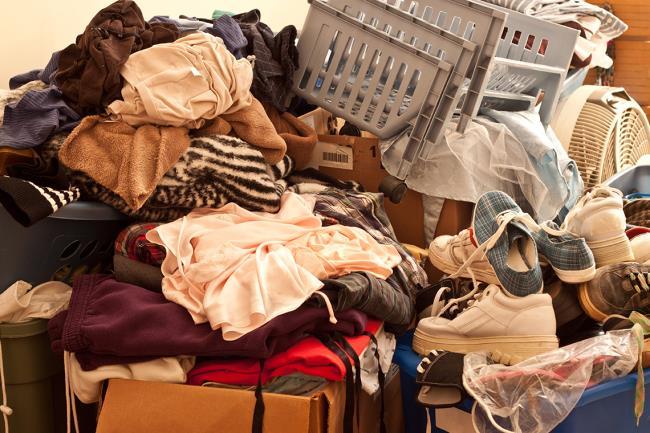


Here are some places to start:


• First attack genuine rubbish. Go through the junk in your rooms and first take out old papers, bills, empty boxes, bags and other bits that are genuine junk. Throw them out. At the same time, go through your kitchen cupboards and boxes and take out junk food. Give it away or even throw it in the bin (I hate throwing food away but if it’s actually harmful it’s best not to give it away).
• Give yourself space to think. Start with a room that you work in – maybe an office or spare room – and get that cleared. Even remove or rearrange furniture to create space and clarity. You should be able to throw away a lot of books and files, re-file and sort other items here. Once you have space here you will have at least once place to feel in control and able to make decisions.
• Carry on around the house. This could take a few weeks or even months depending on how many of you are doing it and how much stuff you have. Aim to sell or give a lot away.
• Simplify life. Get into simpler ways of doing things. Possibly even get rid of gadgets that need to be cleaned too often or are too complicated to use. Simplify the food you eat – basic, fresh healthy stuff rather than pre-prepared, fatty stuff.
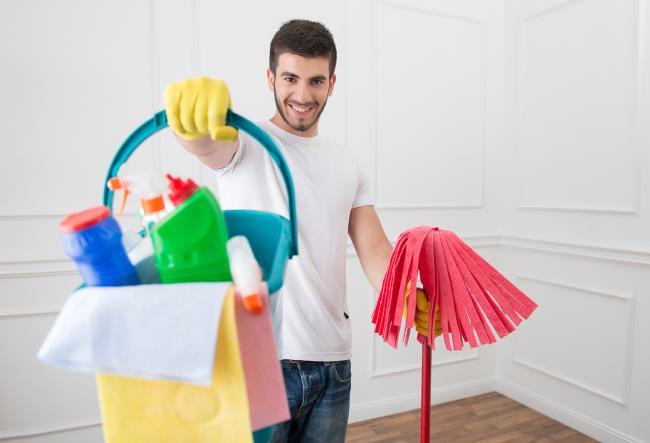

Now you’ve got the bit between your teeth… you can see how much treasure there is in your home – and in your office – that you can turn into cash. Woohoo! Go sell that stuff and give yourself a holiday or a new kitchen (hey, you might be able to make enough for that!).
But then, the question is, what do you do with what you want to keep?
Here are some pointers to get you started in every room in the house, and in the office (including your home-office of course).
For the bedroom one easy way to keep things tidy is to make use of storage space under the bed and on top of wardrobes. You can get special storage bags from Lakeland and elsewhere that fit in these spaces or you can simply use bags you already have for blankets, towels and even out-of-season clothes that need to be out of sight for a while.
You can keep linen or out of season clothes neatly tucked away in closed baskets or boxes. You can get cheap ones in pound shops and at IKEA but you can also make your own by covering plastic crates with nice material or picking up old wooden ones for free on Freecycle.org and painting them.
Use shelves to display books and photographs. This will give them their clear place and keep them from cluttering up other surfaces.
This is a place where you should be ruthless when you sort through the junk. Take out all the gadgets you have and ask yourself sternly if you really use them.
• Has the breadmaker sat in the cupboard for three years untouched?
• Is the sandwich toaster crusted with age?


• Has the chocolate fountain only been used once since you got it at Christmas 2012?
You should also check out Bankers Box® UnderBed storage solutions designed to slot under standard beds. Featuring large windows, you can quickly view the contents without opening each box.
If so then get rid of them. Clean them up and stick them online or put them in the ‘car boot’ box for when you and the family do a car boot sale to sell junk.
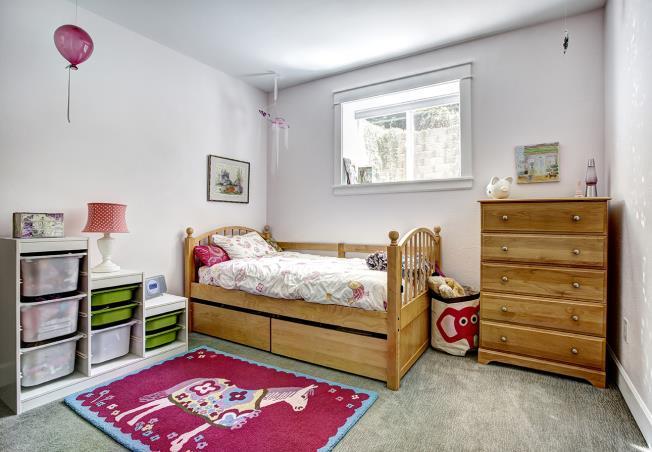
Also, go through all the food in your cupboards and freezer. Give yourself the task of only buying perishables to go with the food you already have for the next month so that you use up what you have before buying more.
Some utensils, like milk jugs and large mayonnaise jars, can be used to hold wooden spoons and spatulas on the worktop. If you have nowhere to put mugs, attach some large screw hooks to the underneath of your shelves and hang them on those.
If you’re running a busy home you’ll need to get things done fast so multiple washing baskets can be useful. Maybe have one for whites, one for dark items and one for coloureds, then washing is faster. If you don’t have baskets, attach three large hooks to the wall and hang three large bags for the different washing types.
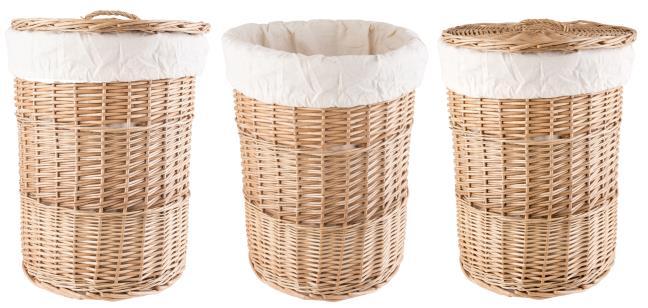

Getting rid of CDs, DVDs, books and magazines can empty out shelving systems and give you a whole new area in your living room that could be used for something else. Spend a couple of hours downloading CDs onto your computer or other device so that you have the music but can sell the discs.
If you have lots of half-used bottles of shampoo, conditioner, moisturiser and makeup keep them in separate bags or boxes in a bathroom cupboard. Put all the hair products in one bag, all the teeth-related products in another, face in another and so on. That way, when you finish one bottle of shampoo you can check the ‘hair’ bag to see if there’s another one to use before you buy a new one.
It’s the same for make-up. Don’t buy another lipstick until you have checked the half-used ones in the bag. It’s amazing what we forget we have!
Aim to create a whole space that could be a dining area or home office, just by decluttering and re-ordering the room.
An attractive magazine rack can help keep papers, magazines and catalogues tidy and out of the way. IKEA do nice cheap ones or you could find one going free on Freecycle or Freegle.
Also, if you’re tired of your coffee table, think of getting one that has storage inside itmaybe even a chest that doubles-up as a coffee table. That way you have storage inside and out. Again, these often turn up on the free sites, including Gumtree ‘Free Stuff’.
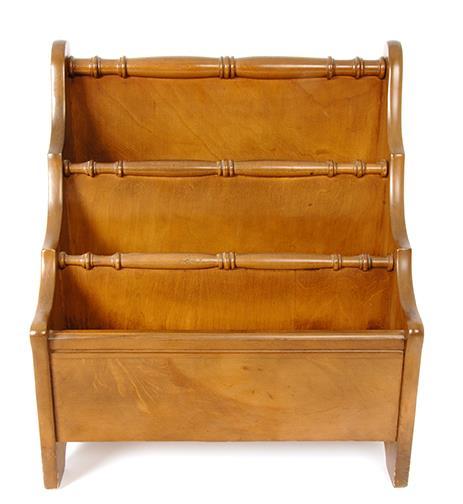
There are more ideas for cheap storage and organising in this video of professional declutterer Ingrid Jansen from the Association of Professional De-clutterers and Organisers (APDO) who shows some of her cheap and easy storage ideas around her home.
Share your decluttering dilemmas and successes on Twitter using the hashtag #ClearYourClutter and follow @ClearClutterDay

They say a tidy desk equals a tidy mind. When it comes to filing habits at work and at home we all have our own way of doing it. A survey by Fellowes has found that 47 per cent of professionals say that a combination of more storage and an improved filing system would improve their organisation.
De-clutter and protect your assets at the same time.
The efficient shredding solution, Fellowes® home office shredders are sleek and compact for quick and secure desk-side shredding. Not only do they help reduce unwanted paperwork but they’ll help protect against prying eyes. Passports, insurance documents, driving licences, bank statements – the list of paperwork and life admin that is stored within the home goes on.
It’s essential to shred any documents that have useful information about you, your birth, your bank details and your tax status. Make a habit to shred everything you don’t need straight away and that will protect your money and keep your home and home-office clutter-free.
Don’t be afraid of destroying something and not being able to retrieve it because digital copies are now so easily accessible.
To choose a shredder that best suits your needs visit Fellowes. For more top tips on de-cluttering inspiration and home office solutions check out the full Bankers Box® product range.



You can buy cheap cable ties (a couple of quid for loads) to keep things looking neat and tidy. Another option is to invest in some wireless technology. A wireless mouse and keyboard mean no annoying cables – and they look cool and minimal too.
Even the most zealous of tidiers will find it hard to part with some things. To solve the perennial problem of ‘I just don’t know where to put it’, make one of your desk drawers the ‘I Don’t Know’ drawer.
Share your decluttering dilemmas and successes on Twitter using the hashtag #ClearYourClutter and follow
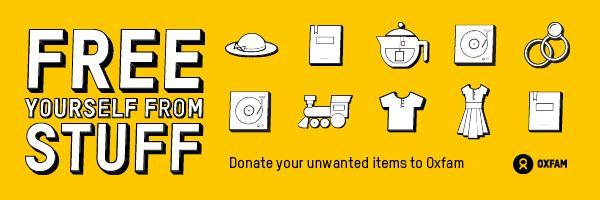
Two thirds of us (44 million) give money to charities every month with an average donation of £16 each time.
We volunteer, run bake sales, take part in marathons and insist that our celebrities do their bit by making fools of themselves on TV for their favourite cause.
And we are rightly proud of our charity shops that raise millions of pounds for good causes, help those on a budget locally and enable communities to recycle products and keep them out of landfill. Truly a win-win situation.
average household has in its cupboards, drawers, lofts and sheds - treasures that could be making good money for good causes.
Its so easy to donate to charity – have you heard of Gone for Good? One of their volunteers will come right to your hme, to pick up your items at the time you’ve specified. How handy is that!
Here are a few of the more surprising items that bring in the cash and where to take them:
Stamps can be really valuable. Quite a lot of charities take them in and sell them on to stamp collectors or dealers. Foreign or old stamps usually make more money, but charities collect current UK stamps as well.

It’s worth just asking your local charity shop if they take stamps and then including them in the bag of stuff you take to them.
But there’s more that can me done, particularly when it comes to charity shops. Too many households are wasting valuable resources by throwing items away rather than helping them to do good through a charity shop.
Share your decluttering dilemmas and successes on Twitter using the hashtag #ClearYourClutter and follow @ClearClutterDay

For example, according to the Love Your Clothes campaign, in 2015 British households were hanging on to £30bn worth of clothes which had not been worn for 12 months. The average UK household owns around £4,000worth of clothes and buys about £1,700worth more each year. Also, 350,000 tonnes of clothing worth £140m is binned annually.
And that’s just the start. There is widespread ignorance of what treasures the

Leave at least 8mm of paper around the edge of your stamp (make sure there’s a good amount of paper still round them because ordinary stamps are sold by weight) and send them off to your chosen charity or take them to your local shop. Charities that collect old stamps include RSPB, DHIVERSE and the World Owl Trust.
Alternatively, donors can send stamps to Charity Stamps Direct which will allocate the money to the donor’s chosen listed charity on their website.


It takes 3.5 litres of oil to make a new laser printer cartridge and 90ml of oil to make new inkjet cartridge? Giving charities your empty cartridges helps them to sell them directly to companies which refill them and sell them on.
This makes them money and decreases the 1800 tonnes of cartridges that end up in UK landfill sites every year. Recycle and you will not only help charities but help the planet!
Collect up your printer cartridges and either email the charity for a freepost envelope or take them down to your local charity shop. Why not suggest the scheme at work too? It will generate extra funds for your chosen charity and make the company look good!
Charities collecting printer cartridges include RNLI, Sense, Barnados, World Cancer Research Fund and the British Institute for Brain Injured Children. Boots the Chemist also recycle printer cartridges and they give 100 Boots advantage points per cartridge while donating 20p to charity.
Share your decluttering dilemmas and successes on Twitter using the hashtag #ClearYourClutter and follow @ClearClutterDay
Charity shops will take glasses of all types including sunglasses (in fact those are likely to sell better than prescription ones).
However, it’s also a good idea to donate them to a sight charity. Sight charities collect old spectacles to send to people with sight difficulties in developing countries. All you have to do is take your old glasses into your local donation point.

The main national project at the moment is Vision Aid Overseas, but smaller local charities near you may also collect. To find your local collection point, use their location finder here
All branches of Dolland and Aitchinson stores and most Boots stores have glasses recycling bins where you can deposit your old spectacles to go to Vision Aid and other needy causes.
You know what happens when you come back from holiday with those spare few Euros in your purse and you wonder what to do with them as you have too few to change at the bank.
Well, instead of accumulating a mini coin collection in your top drawer, give it to your local charity. Some charities are also still collecting old currency from Europe that you can no longer use.
Take your spare cents, francs and lira down to your local charity shop or, for very heavy collections, free collection is often available. Charities such as RNIB collect current foreign currency, while charities such as Help the Aged, Marie Curie and Age UK collect old currency that you can no longer change.


With mobile phone companies constantly offering free phone upgrades and new handsets with new contracts, the number of discarded mobiles is increasing rapidly. Instead of throwing out your old phones, give them to your local charity which can sell them on (even if they don’t work).
This is a great thing to do if you’re getting a new phone for your birthday. Contact your chosen charity for freepost envelopes to send them your old mobiles.
Charities currently collecting old mobiles include Mencap, ActionAid, Bliss, Age UK and CLIC Sargent.
Another possibility is that you can make money for yourself and give this directly to your charity by doing your own recycling. For more information on recycling mobile phones see our article here.
Use this mobile phone comparison tool to find out which companies will give you the most amount of money for your mobile phone and, therefore, which will give you the most to give to charity! Organisations that say they will recycle for charity often don’t give as much money for your phones as the
usual recycling companies. You’re often better off doing it yourself.
Having a sort-out in your wardrobe to make room for this season’s latest fashions? Donate your old clothes to charity, where they can be sold in charity shops to make extra money for that charity, or sent to those in need.
On the whole, retro or designer clothes make the most for the charity shops, but all clothes are accepted as long as they are clean and in good condition. Either take your clothes down to your local charity shop or your nearest clothes bank. Some charities will also collect clothes from your home if you phone up to ask.
Nationwide charities that collect clothes include the Salvation Army, Oxfam, Sue Ryder, and the British Red Cross

If you have any Marks & Spencer’s clothes that you can donate, Oxfam offer a £5 Marks and Spencer’s voucher to every bag donated that contains one or more item of clothing (with the exception of lingerie and swimwear) from Marks and Spencer.


Oxfam has traditionally been the first port of call for those wanting to donate furniture to charity. They have furniture ‘showrooms’ in a few parts of the country.
Also, though, the Furniture Reuse Network runs an excellent website that will put people in touch with charitable organisations in their area that need furniture. Volunteers pick up the items in vans and lorries and take them to homes, churches, charity shops and voluntary organisations that need them.
You can read Oxfam’s tips “Why you should de-clutter and donate this Spring” along with many other de-cluttering ideas on MoneyMagpie.com

For many, the free sites like Freecycle and Freegle act as a type of charitable conduit for furniture and other items from those that have but want to give away to those that are in need.
Donors are asked to sign a short Gift Aid Declaration form which confirms that they are a UK tax payer, and gives the charity permission to sell the goods on their behalf.
One of the biggest barriers to getting items to charity shops is the difficulty some have transporting the items, particularly bulky goods. This is where Gone for Good meets a need.
When you take your unwanted stuff to your local charity shop, ask them if they have a Gift Aid scheme in place. You could help them make even more money without any cost to yourself as it enables the charity to collect an extra 25p in tax relief for every per pound raised by selling the items in its shops.
Gone for Good is a social enterprise set up to both support retail charities and to encourage people to donate unwanted goods to charity and so avoid sending them to landfill.

By using the Gone for Good smart phone app, users can donate their unwanted stuff to charity by simply taking a photo of their unwanted goods on their phone. The app makes decluttering and house clearances easy. The app locates partner charities who collect the categories of goods offered from the user’s Postcode. No need to ring around or leave your home. The app is free and the charities collect for free.
Gone for Good partners with lots of national charities (such as British Heart Foundation, Cancer Research UK, Mind, Shelter, Sue Ryder and Debra) as well as with several local charities and hospices.

Share your decluttering dilemmas and successes on Twitter using the hashtag #ClearYourClutter and follow @ClearClutterDay

Celebs are just as clueless when it comes to clearing clutter as we are. In fact, quite often the more money people have, the more they buy and so the more clutter they have… unless they have learnt their lesson and start organizing themselves better. Here are a few tips from celebs in the UK and abroad for de-cluttering and organizing your stuff around the house.

Actually, it wasn’t Oprah who thought this up but she made it famous. It’s pretty clever too.
If you suspect you don’t actually wear a lot of the clothes in your wardrobe, then hang all of your clothes with the front of them facing to the right in your wardrobe. After you wear something, hang it up with the front facing to the left.
After a few months you will see pretty easily which clothes you’re not wearing because they will be the ones still facing to the right. Anything that is still facing to the right after six months should either be sold online or given to the charity shop (unless you suspect you might wear it later in which case give yourself another six months, but no more!)

Marie Kondo, author of the international bestseller, The Life-Changing Magic of Tidying Up: The Japanese Art of Decluttering and Organising says tidying creates joy because it means that anything that doesn’t “spark joy” is removed, leaving only items that give you joy. Kondo is a celebrity in Japan and is inundated with requests to help clients tidy and sort their belongings.
Interestingly, her method involves gratitude for what you have, which is a happy approach in itself. You take up every item

that you’re clearing. look at it, consider it and if it doesn’t ‘spark joy’ in you, then you thank it for what it has done for you and then you sell or give it away so that it can do good for someone else.
She says that the results can be lifechanging as people find themselves surrounded entirely by things that give them joy. She even says that when the reader has finished her book they should get rid of it in a good way (unless, of course, it sparks joy!).
These are some of her tips for clearing clutter around your home:
• She suggests de-cluttering by subject rather than room by room. Start with the things that are easiest to part with and then get to the harder stuff at the end. So you might start with your books in all rooms. Then after that go through clothes, then shoes, then cooking utensils.
• She says you should focus on what to keep rather than what to get rid of which means you start with a positive rather than a negative approach.
• Anything that doesn’t spark joy in you is to be touched, thanked and then sent on its way towards a better life elsewhere.

TV presenter Anthea Turner, has lots of brilliant de-cluttering tips on her website Antheaturner.com including these:

• Get the whole family involved. Let everyone know and they can be a part of the decision making. The golden rule here is that ‘everything has a place’ and if everyone in the house knows where that place is, your life will become easier.
• Plan your clearing: Before you begin, look in every cupboard and drawer, regardless of what it contains at present, and decide what you are going to keep there in the future. Then, as you are tidying, you will be able to put any misplaced items where you want them to be.
She says that when you switch bags, rather than just dump everything from one to another, keep the contents in small mesh bags so that it is all kept together as you transfer them and you don’t lose anything.
(didn’t get her elected though, did it?)
Hillary Clinton really knows how to keep her handbag organised.

Jasmine, founder of MoneyMagpie.com and of the Clear Your Clutter Day campaign, has several tips for clearing clutter and keeping things organised. She says:
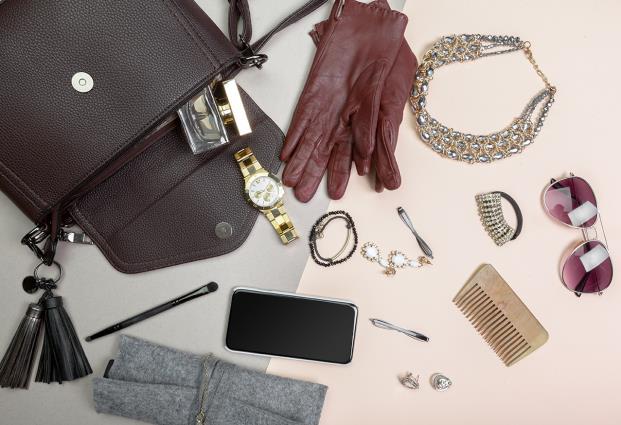
“A while ago I realised that I had lots of halfused or unused bottles and jars in the bathroom, so I gathered up a few bags and small boxes and divided them up into all hair products, all lip products, all eye products, all nail products etc and put each lot into a different bag or box in a bathroom cupboard.
So now, if I use up one shampoo bottle I check the hair products bag before I buy another one. Same with lipsticks, toothpaste and so on. It’s amazing how much half-used make-up and other products I have in there. I’ve saved a lot of money by using what I’ve got in there first!”
Jasmine also stores her winter clothes in bags during the summer and does the same with her summer clothes at the start of winter.
“It means that I have a lot more room in my cupboards and drawers and also putting things away and taking them out again are both good opportunities to weed out the clothes I know I haven’t worn for years and am not likely to wear again. The charity shop does well at least twice a year!”

It’s a wonderful feeling to get yourself organised and clutter-free.
In fact, when we asked our MoneyMapie.com readers how they felt once they had done a good Spring Clean and de-clutter, they said it made them feel rejuvenated and gave them a generally positive outlook.

But it doesn’t take long for the clutter to creep in. If you’re anything like me it seems that books, cosmetics and bric a brac seem to breed on the shelves all on their own! So, to keep the clutter at bay and stay on top of your stuff day-to-day, follow these handy tips:

•
• Keep a ‘charity bag’ or box handy in a cupboard so that you can pop in there anything you know you want to get rid of. Once it is reasonably full, take it to your nearest charity shop or book a collection volunteer with Gone for Good.
• If you like watching TV of an evening, grab a drawer or empty a shelf that needs sorting while you’re watching. It gives you something to do with your hands while you’re watching (which also stops you snacking!) and makes you feel virtuous at the end of the evening because you’ve done something useful instead of wasting
it in front of the box.
• Get the family into organised habits. Use a family calendar pinned on the wall for everyone to put their ‘appointments’ on; parcel out household chores to the kids and set up a timetable for when each one has to do the dishes, lay the table, clean their room etc; do a family car boot sale or even garage sale once or twice a year where the kids are allowed to keep money made from selling their things.
• Set aside a few hours once a year to switch your monthly bills like gas and electricity, phone and broadband, insurance etc.
• When you change your clothes seasonally, go through the ones from the old season and throw out or sell any you haven’t worn all season and know you won’t wear again. With the new season’s clothes, try them on before putting them in wardrobes and drawers to find new combinations of clothes.
Take a few minutes to quickly tidy and throw anything you don’t need away. If you do it every day, it’ll only take you 5 minutes.